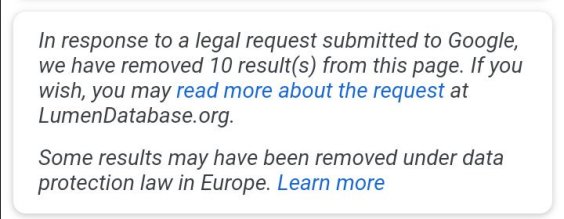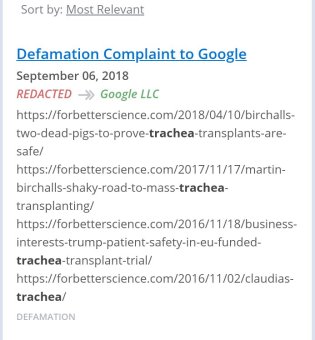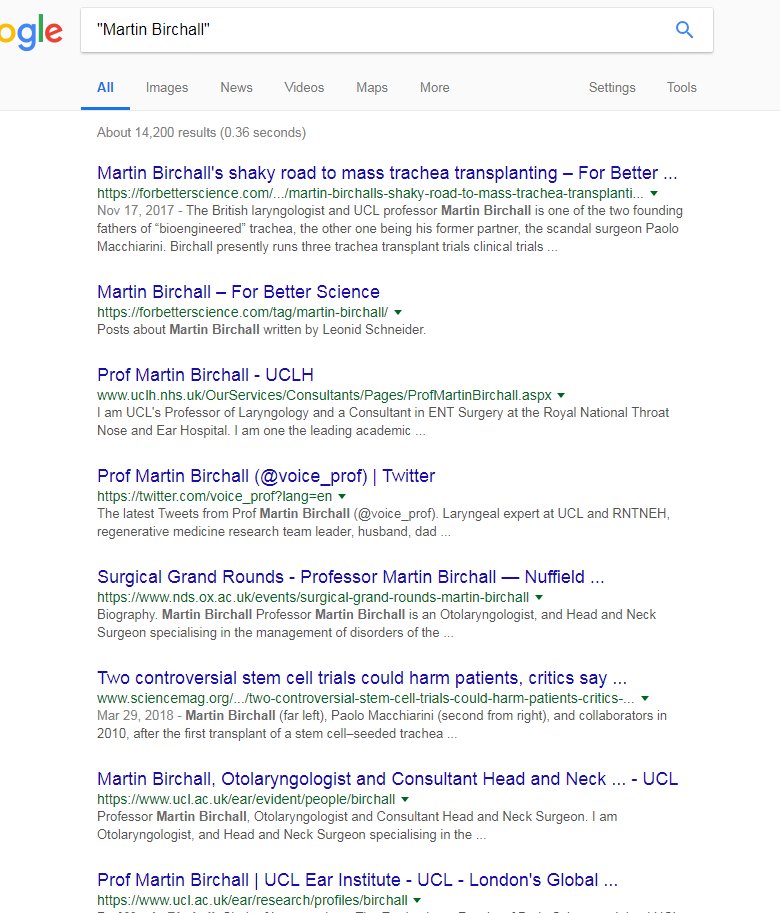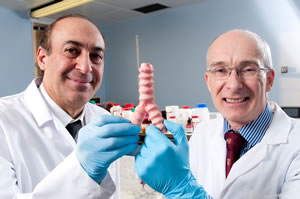A “defamation Complaint” was lodged with Google, against 6 of my articles and one cartoon. Each of them affects to some degree the British laryngologist Martin Birchall, professor at UCL in London and former close associate of the scandal surgeon Paolo Macchiarini. Together the two surgeons set up a trachea transplant technology, first with decellularized cadaveric tracheas, then with plastic ones. Presently, only one survivor remains. Two others were saved when the grafts were removed, the rest, up to 20 patients, died. Even Birchall’s pigs died when he tried transplanting them with a decellularised trachea. The UK and EU authorities were still willing to give it another go and to see three times as many humans operated. But my reporting, thanks to invaluable help from my readers, spoiled it all.
Somewhere in 2011, the friendship between the two men turned to fierce animosity and competition. When the Macchiarini scandal broke out in 2015-2016, Birchall succeeded with distancing himself from his past partner and to convince everyone (against basic facts) that he and his UCL never ever used or approved of the deadly plastic trachea. In reality, Birchall and UCL even now continue researching plastic tracheas on pigs, for future use in humans patients. This grant is presently funded by UK government, and the funder Engineering and Physical Sciences Research Council (EPSRC) refuses to comment on it.
Macchiarini was sacked by Karolinska Institutet, and then by both his Russian academic employers. It is not clear what he is up to right now, he sure became a pariah everywhere (with the sole exception of German courts, where I was found guilty of slander, in two separate cases, with Macchiarini admitted as the expert witness by the Appeal Court). The German judges pat themselves on the back for having protected the medical career of Macchiarini’s right-hand man Philipp Jungebluth against the Lügenpresse, for the benefit and in the name of The German People. In reality, those final and unappealable libel sentences against me are now being used (also by UCL) to discredit my reporting and the objective evidence I gathered, in order to resume trachea transplants EU-wide. The current Google delisting under the pretense of a “defamation campaign” likely presented those two court verdicts to Google as evidence against me.
It is now the question if the German court verdicts against me will be used in getting Macchiarini’s and Birchall’s trachea transplants rehabilitated, and the transplants resumed. The media, when writing about Macchiarini, carefully avoids discussing decellularised tracheas (with one exception so far). UCL invested a lot into this technology, and they want to continue. In fact, they transplanted a child just last year, as an unregulated “compassionate use”, the outcome is secret.

Birchall managed to get out unscathed of two (soon 3) investigations by his employer UCL, simply because the investigators repeatedly chose to rely on his words rather than to screen any actual evidence. Most importantly, Birchall succeeded to present his own very similar regenerative technology of decellularised trachea as the tool to treat masses of trachea stenosis patients, which would himself, his UCL and their business partner, the Liverpool-based company Videregen, an obscene amount of money. This became the official view not just in UK media, but also among the British and EU funding agencies like The MRC and EU Commission.

Only my site offered an alternative perspective and reminded of all those dead patients. Because of my reporting, two phase 1 clinical trials with decellularised trachea and larynx were terminated or suspended, without a single patient being recruited, while the EU-funded phase 2 trial ran into a dead-end because it cannot commence without the results from Phase 1. Also the British parliament scrutinized these clinical trials after two Liverpool academics, Patricia Murray and Raphael Levy, informed them of the many omissions and incorrect information Birchall, UCL and Videregen provided to the authorities. As a response, Videregen engaged an elite London law firm to threaten Murray, Levy and their university. Meanwhile, Videregen is searching for partners to market Birchall’s trachea transplant outside the EU.
And now, someone, likely Birchall, but maybe Videregen or even UCL themselves deployed lawyers to make Google remove my relevant articles from the web. It seems only UK (or maybe the Common Wealth) is affected, this is the message they get when searching for “Martin Birchall”:

Outside of the UK, the search results seem largely unaffected. It is already the second time my site was hit by such Google-delisting activities on Birchall’s behalf. The first time was in February 2017, I saw these activities on my site and soon after, my Birchall articles disappeared from Google search results.

Eventually, the search results returned, and I found out and published much more. The clinical trials were suspended, Birchall got another misconduct investigation, this time about data misrepresentation (UCL is busy to let him whitewash himself there). So now once again, professionals, apparently lawyers were sent to discuss my crimes with Google. This is the aforementioned Lumen database request, however the allegedly attached legal complaint letter is not available:

The defamation complaint was placed on 6 September 2018, again according to same Lumen Database.

This indeed proves “how enhancing research culture doesn’t require major effort and resources” as the Vice-Provost for Research David Price now indicated. He is namely advising the new central UK public funder UKRI and the Royal Society on how to implement research integrity into practice. This is namely how, you deploy lawyers against everyone opening their mouth. Price’s point 7, Embed research culture at an institutional level, gets an utterly new and very sinister meaning.
Now I will briefly explain what was removed from Google search in UK, followed by some extra rather embarrassing information about plastic tracheas which UCL does not want you to know.
First to be delisted was the hyperlink to this cartoon I made, of two UCL researchers preparing a figure for a peer-reviewed publication on the efficacy of the decellularised cadaveric trachea transplants in a pig model, in order to inform already approved human phase 1 and 2 clinical trials.

Next, this article, where the cartoon was used and which describes how two dead pigs served as secret hush-hush evidence submitted by Videregen to EU authorities, who then declared the method safe for use in human patients, including children (yes, this was specifically approved by EMA). One pig lived for a month, the other only 12 days after receiving a trachea transplant. Good enough proof-of-principle to test it on dozens of adults and children with tracheal stenosis, whose minimal life expectation at recruitment stage must be 5 years at least. So, this article must never be seen by any prospective patients:
The next delisted article sums up all Birchall’s clinical trials, the two phase 1 trials Inspire (cadaveric trachea) and RegenVox (cadaveric larynx and upper trachea), and the phase 2 trachea transplant trial TETRA. And all the omissions and incorrect information Birchall and his trial partners Videregen and Catapult UK provided to the authorities there. The article is always the first top result whenever anyone anywhere in the world searches “Martin Birchall”. It had to go also.
https://forbetterscience.com/2017/11/17/martin-birchalls-shaky-road-to-mass-trachea-transplanting/

Even my EU reporting was declared a defamation campaign. The following article focusses on the refusal of the EU commission to release the documents or any information associated with the phase 2 clinical trial TETRA. There, 48 patients were set to be treated in the UK, Italy, Austria and Poland, with cadaveric tracheas made in the UK and in Germany. Even if it is not that much about Birchall or UCL, the article had to go. It makes TETRA look bad. Funny, the follow-up article was unaffected.
What also had to go, was the story of the very first trachea transplant Birchall and Macchiarini performed in 2008. Because the graft failed already 3 months after the operation, Birchall and UCL had to invest a lot of energy to keep presenting it to media and even UK Parliament as a life-saving story which it never was. They also had to hide the history of hos that bronchial graft was prepared: namely in Birchall veterinary lab, back then at the University of Bristol. Without the knowledge of UK authorities, a human organ replacement for in-patient use was prepared in a lab where pigs were dissected. The University of Bristol announced that all records of that have disappeared, and deleted past revealing press releases.
https://forbetterscience.com/2016/11/02/claudias-trachea/

Even this following old article had to be removed: using Freedom of Information, I managed to obtain patient information sheets which Birchall intended to serve his prospective patients in the Inspire trial for signing. The patients were to be severely misinformed, real risks such trachea transplants brought were not mentioned, the deaths of previous patients omitted or misrepresented as unrelated accidents, while the information what exactly Birchall intended to do to his patients was all but clear. Maybe he didn’t know himself and was still experimenting on pigs and human compassionate use cases.
Finally, this last delisted article is not even primarily about Birchall, but about Macchiarini. It is about the farce of UCL’s investigation from 2017 where a panel of external academic experts refused to screen any evidence and decided to rely on testimonies only. It ended up with Birchall being completely whitewashed and the already sacked physicist, Alexander Seifalian, who used to make plastic tracheas for UCL, presented as the scapegoat for everything. The article also mentions the 2017 trachea transplant which UCL performed on a child and is keeping otherwise secret. It therefore had to be removed from the Google search.
https://forbetterscience.com/2017/10/03/alexander-seifalian-ucls-persian-scapegoat/

Actually, also that article had a follow-up, which revealed that UCL investigators wilfully ignored testimonial evidence when it did not fit their pre-set narrative. It also proved that UCL was not just well aware of what Seifalian was doing, they actually encouraged him and were extremely enthusiastic about plastic scaffold for various bits of the body.
Plastic airways make a comeback
What the UCL investigators prefer not to hear, see or say was the simple fact that UCL is currently in possession of a GBP 845k grant to research plastic tracheas. It was awarded in 2014 for 5 years by the governmental funder EPSRC to Seifalian and his UCL colleague Wenhui Song. After Seifalian was sacked, Song became the only PI. Listed among other co-investigators are Birchall and other UCL figures. The grant’s title:
“Manufacturing bespoke human organs; 3D printed nanocomposite trachea”
A quote from the grant description:
“Our well-publicised successes in using tissue-engineering to replace hollow organs in cases of compassionate need have shown the world that an engineering approach to hollow organ replacement is feasible, as well as serving to highlight those areas where more work is required to provide bespoke manufactured tissue scaffolds for routine clinical use Being able to replicate a functional part of one’s body as an exact match and therefore to be able to replace it ‘as good as before’ is familiar in science fiction. Most implants will share limitations that are associated with either the materials used or the traditional way in which they have been made. With the advancement of additive manufacturing technology, 3D printing, biomaterials and cell production, printing an artificial organs is becoming a science and engineering fact and understandably can save lives and enhance quality of life through surgical transplantation of such printed organs produced on-demand, specifically for the individual of interest.”

When the grant began in 2014, in some cases even before it was evaluated in February 2014, every plastic trachea patient of these “successes” was already dead. The funding will continue until February 2019. Now it is about torturing pigs to death, but Birchall’s and UCL’s declared goal is to treat humans with 3D printed plastic tracheas:
“The successful outcome of this research proposal will enable manufacturing of tailor made organs for those require critical clinical attention and can potentially change the NHS surgical protocols for organ transplantation. This will shorten waiting times, allow early effective treatment, shorter hospital stay, and reduce or eliminate costs for direct hospital and palliative care costs, costs to the patient and loss of productivity e.g. employment (indirect costs). Therefore if this clinical need was to be successfully met, at a cost that was acceptable to society, not only will patient’s benefit (reduced mortality/morbidity) but also national resources. Once we have established the exemplar protocol with this project it will catalyse the progress of a number of other tubular organ manufacturing to potentially have a greater impact”.
Now you see how credible the claims by Birchall and UCL are that they were always against Macchiarini and his deadly plastic tracheas, and aside of Seifalian’s past sneaky misdeeds, UCL had nothing to do with those anyway.
There is another grant UCL received from EPSRC, worth GBP 730k, it is about other types of plastic organ grafts:
Evaluation of next generation nanocomposite polymer coated stents incorporating stem cell capture technology for enhanced in situ endothelialisation
The project description contains this bizarre quote:
“For example, we developed a range of surgical implants using nanocomposite polymers with a number of successful outcomes, such as the world’s first synthetic wind pipe over 2.5 years ago and the patient is doing very well”.
That patient was the first victim of the plastic trachea, his graft was made at UCL and sent to Karolinska in Sweden where Macchiarini and Jungebluth used it for their lethal and unethical research on a human being, in June 2011. The patient died horribly in January 2014, before this grant proposal from UCL was evaluated by EPSRC. The funding period will continue until March 2019.
The public funder EPSRC, as well as the new overarching UK central funding agency UKRI, ignored all of my emails. I am a slanderous convicted criminal after all.
Update 17.02.2019. A new paper published by Birchall and Lowdell. It uses cell culture to suggest to use larynx replacement made of plastic (POSS-PCUU) in patients.
https://doi.org/10.1016/j.msec.2018.07.003
“POSS-PCUU may be a potential candidate for overcoming some of the limitations associated with laryngeal reconstruction and regeneration. […]
Although much work is still required, POSS-PCUU has some promising features for the fabrication or coatingof advanced bio-integrated implants for unmet healthcare needs”
Plastic larynx replacement used to be a subject of preclinical research for RegenVox, funded by The MRC. It proved a disaster in pigs (decellularised larynx didn’t fare much better). The paper declares MRC as the funder.
Yet MRC’s Declan Mulkeen declared in his 2018 submission to UK Parliament (highlight mine):
“The current RegenVOX grant followed on from a previous MRC-funded grant held by Professor Birchall at UCL. The initial RegenVOX[2] award started in 2011 and supported a laboratory-based study to underpin development of a ‘tissue-engineered larynx’ using both synthetic and biologic (cadaveric) scaffolds, including animal studies in pigs. The study demonstrated that synthetic scaffolds were inferior to biologic ones; since this finding synthetic scaffolds have not been pursued further with MRC funding.”
Apparently, someone, or everyone, is lying here. What seems clear from all of the above, UCL only pretended to have abandoned plastic airway replacement research in wake of Macchiarini affair. The work quietly continues, and might eventually catch up with patients, if not in a clinical trial, then under compassionate use.

Donate!
If you are interested to support my work, you can leave here a small tip of $5. Or several of small tips, just increase the amount as you like (2x=€10; 5x=€25). Your generous patronage of my journalism will be most appreciated!
€5.00


Patients life’s unfortunately we cannot recover but perhaps the data generated by the wrongdoing could be applied in further useful research starting in animals obviously first till we get enough data showing the technique is safe to test in human beings and testing different materials and techniques for artificial trachea transplants. This could be really a useful treatment given that they get to the right materials and right techniques
I think also fresh new scientists rather than Birchall or Machiarinni should start this new research
LikeLike
I think Birchall and Machiarinni should be prosecuted for their actions and never allowed near a patient or scientific journal ever again.
LikeLike
The ultimate problem is that a regenerated trachea or bronchus or larynx needs a lining of epithelial cells (otherwise it is just a moist agar plate waiting for airborne pathogens), and it needs vasculature, to keep that epithelial lining alive. A ciliated respiratory epithelium and a network of arterioles and capillaries grow out of specific, partly-specialised stem cells. They don’t just appear by magic when bone-marrow stem cells are growing in a 3D plastic mesh.
Prof. Delaere was eloquent about all this: https://forbetterscience.com/2016/04/02/macchiarini-and-the-tracheal-regeneration-scandal-by-pierre-delaere/
LikeLike
Indeed I think that is garbage…in my opinion the goal would be to develop an artificial trachea similar to an artificial heart to condemned patients…the artificial heart already are capable of substantially prolong patients life
LikeLike
True, the trachea science on show here is more akin to a cargo cult than a rational inquiry.
LikeLike
the data generated by the wrongdoing could be applied in further useful research
There was no data, alas. Macchiarini made stuff up and changed labels. Pigs magically multiplied or disappeared.
LikeLike
I was referring to clinical data referring to patients to whom these interventions were performed…it is sad but perhaps could be used to save other lives in future although for these already lost lives we cannot do anything unfortunately
LikeLike
Hopefully they will be persecuted
LikeLike
I am visiting London this week. Maybe I should I bring some banners to plaster UCL, so that the researchers there also will get the important information about their impossible trachea and wind pipe research?
Could we, as users of Google, also send a complain to Google for unjustified censorship?
LikeLike
Pingback: New government cash for trachea transplanters Videregen – For Better Science